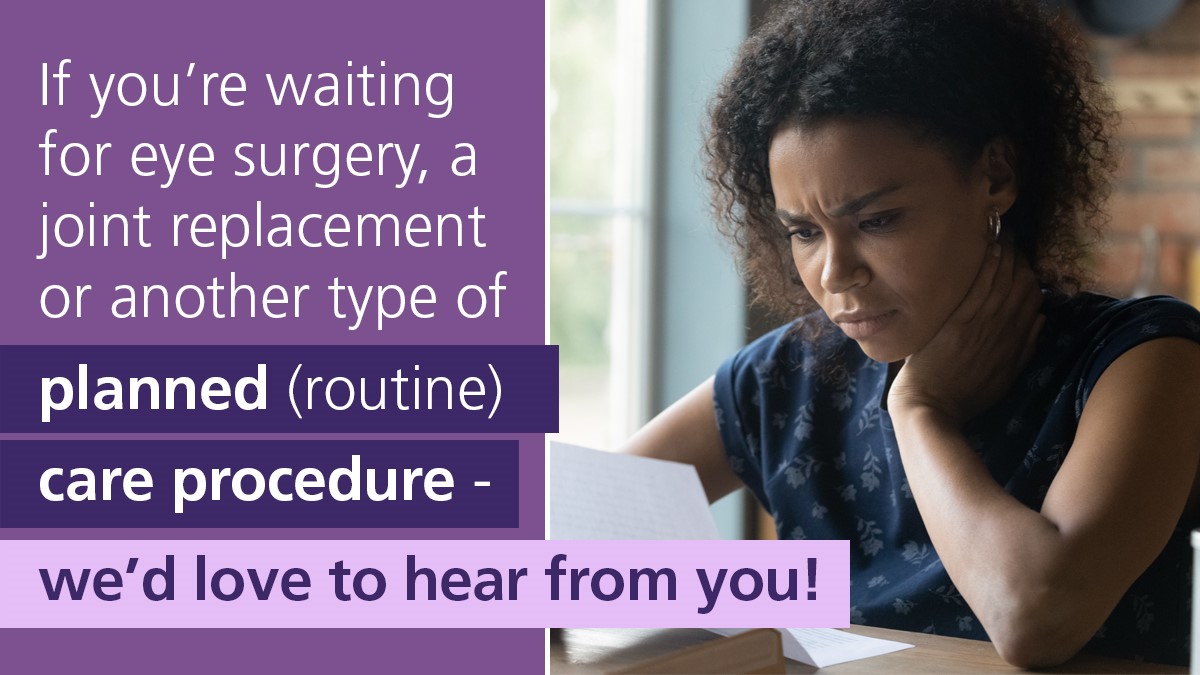The panel, made up of adult volunteers from across the area who were all patients on the waiting list for planned care, was in place from June to September 2021. There were some challenges to running a temporary and virtual citizens’ panel during a pandemic, but these were outweighed by the many benefits.
 Challenges
Challenges
- Because of the high number of people on the waiting list for planned care at the time, we were worried initially about how we would choose panel members if we received potentially hundreds of applications. This didn’t happen which was totally understandable given the fact that we were at the height of the pandemic, and people had other things on their minds, including their health concerns. It wasn’t a problem though. We ended up with nine brilliant and giving people who shared their experiences in depth and contributed to the discussions throughout.
- The feedback of nine people may not be considered by everyone as ‘worthwhile’ but we disagree. Panel members had a great deal of experience of accessing planned care services over the years. In addition, most panel members had friends and relatives who were also waiting for a planned care procedure, a referral or a diagnostic test, so they were able to share their experiences of having a close connection with someone affected by the delays too.
- We targeted other patient participation groups and networks, including the Race Equality Network in the recruitment process but due to the low number of applicants, the panel was not considered to be representative of our population, or of the people using local services. However, panel members were very representative of the issues facing people on the waiting list for planned care, and they had personal experience of a variety of health conditions, including musculoskeletal (MSK) conditions, eye care, mental health issues, gynaecology, and cancer diagnostics.
- As strict Covid restrictions were in place, we were unable to meet panel members in person. The meetings took place online which allowed us to reach people from across the whole West Yorkshire area. Having virtual meetings also made it easier for us to be able to involve busy clinicians and programme leads who may otherwise have been unable to take the time out to travel to a venue. The online meetings were held on different days and times to fit in with the various commitments of panel members.
- Panel members were recruited via email, so most people did have access to a computer or a smartphone and the internet. However, even then we had one panel member whose internet would not work but they were able to join the meeting via the telephone to listen to the discussions and ask questions.
Benefits
- All panel members were waiting for a planned care procedure and had expressed frustration but were able to understand the root of the problem and how professionals were trying to solve it. They were keen to support the elective recovery work and in doing so, help other patients in the same situation as themselves.
- Having just nine panel members gave everyone the opportunity to share their experiences in detail and contribute their ideas without having to be cut off due to the restrictions of a larger group. By taking the time to listen to panel members, we also gained a great deal of insight into other healthcare services, not just planned care. This insight has been shared with the relevant programmes including Mental Health, Personalised Care and Social Prescribing Services.
- Clinicians and managers came away with a better understanding of how waiting for a procedure affected people and their carers:
"Although I was aware of the dreadful impact that long waits have on people’s lives, hearing this for myself from patients affected, and seeing their anguish and distress, is what really brought it home." - All panel members said they appreciated being listened to - and appreciated being connected with others who were going through the same experience. Some panel members who felt empowered by the experience went on to challenge the system – and got results.
- The process was two-way, not just the NHS asking questions and patients answering them. The discussions were varied, interesting, lively, and respectful on both sides resulting in a great deal more insight and valuable feedback than expected.
- Although panel members had only signed up for a specific number of sessions, they wanted to continue to be involved so we highlighted opportunities elsewhere in the Partnership for them. Plus, we are making plans for the panel to reconvene in June 2022 to talk about the progress made, almost one year on.
More information about the panel it is available here on our website

